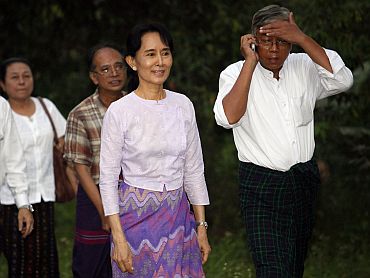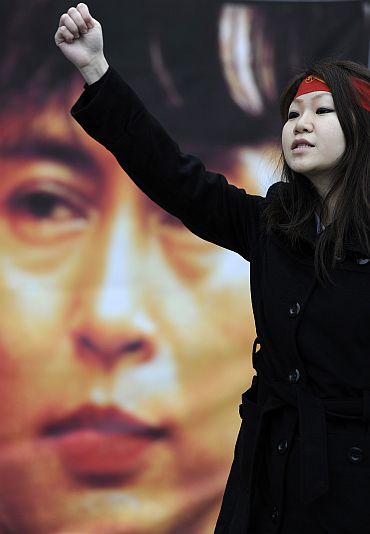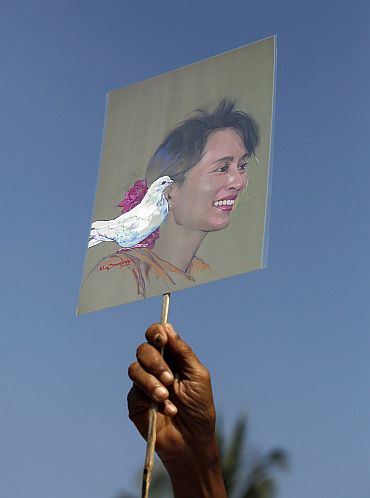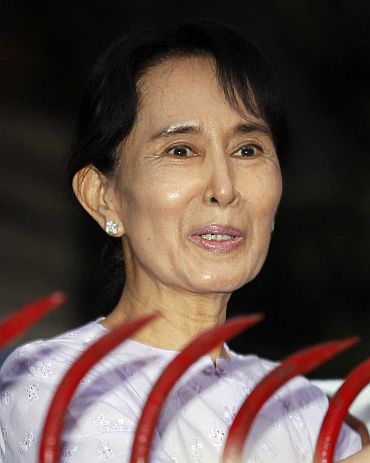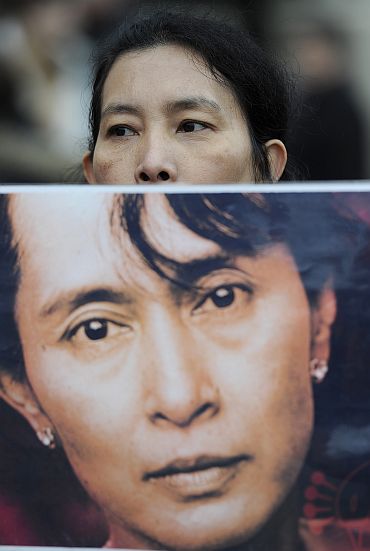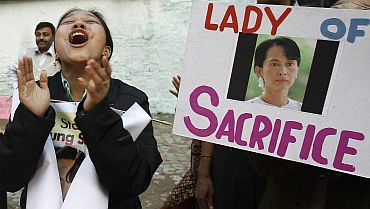 | « Back to article | Print this article |
Post release, Burmese activists fear Suu Kyi's re-arrest
"As she is released, her safety and possible re-arrest become major concerns," Aung Din, a colleague of Aung San Suu Kyi during the 1988 popular democracy uprising and executive director of the Washington-based US Campaign for Burma, said.
According to various sources from Myanmar, Aung Din alleged, the military authorities have recruited some people with criminal records in Yangon with a plan to attack her if she continues to challenge the regime and its implementation of the sham election results.
She had previously been attacked by the pro-regime militia, notoriously known as "Swan-Arr-Shin" (Power Rangers) in the past several times, a militia organised and supported by the Union Solidarity and Development Association, which recently transformed into the USDP, he said.
Agencies
Click NEXT to read further..
'People admire her as the only leader who can bring democracy to Burma'
Aung San Suu Kyi was also released from detention before, only to be re-arrested, he noted. She was under house arrest for six years from July 1989 to July 1995.
She was again arrested and detained for 18 months from September 21, 2000 to May 6, 2002. On May 30, 2003, she and her party members were brutally attacked by the regime's militias near Depayin township in central Myanmar. Scores of her party members were killed, and she was detained again until today.
The Burmese democratic icon spent more than 15 years under detention between 1989 and 2010. "Although the regime has repeatedly attempted to attack, assassinate and isolate her from the public, her popularity remains highest among the public as the people admire her as the one and only national leader who can bring freedom, justice and democracy to their country," he said.
"Her release is a hollow gesture to appease the regime's detractors, not a sign of political reform," Aung Din said. "The international community needs to continue to pressure the regime to secure her safety, prevent her re-arrest as well as demand the immediate and unconditional release of all remaining 2,200 political prisoners," he said.
'The real question is how long Suu Kyi will be free'
Freedom Now, a legal advocacy organisation based in Washington, who represents Aung San Suu Kyi as her international counsel as retained by a member of her family, also raised similar concerns.
"Unfortunately, her release alone is virtually meaningless until the junta enters into an irreversible process of dialogue resulting in national reconciliation between the junta, the National League for Democracy, and ethnic groups and a restoration of democracy to Burma," said Freedom Now president Jared Genser.
"For anyone who might mistakenly view this release as a sign of change, the international community should recall that Ms Suu Kyi was released from house arrest three times previously in the mid-1990s and early 2000s and nothing fundamentally changed in the country," Genser cautioned.
Elaine Pearson, deputy Asia director at Human Rights Watch said her release now is a deeply cynical ploy by the military government to distract the international community from its illegitimate elections.
"Suu Kyi has been in a revolving door from detention to freedom for more than 20 years, so the real question is how long she will be free this time and under what conditions," Pearson said.
"If the military government is serious about increasing political space after the elections then it will release all political prisoners immediately and unconditionally," he said.
World hails Suu Kyi's release
Meanwhile, global leaders and fellow Nobel laureates on Saturday welcomed the release of Burmese democratic icon Aung San Suu Kyi from house arrest, hoping that it will pave the way for restoration of real democracy in the country.
Myanmar's military government freed the 65-year-old Nobel Peace Prize laureate, who has been detained for 15 of the past 21 years, after her latest term of detention expired.
United States President Barack Obama, his Democratic party predecessor Bill Clinton, United Nations Secretary General Ban Ki-moon, and as many as six women Peace Laureates celebrated the release of Suu Kyi.
Obama, who is on the last leg of his 10-day tour of four Asian democratic countries, called Suu Kyi "a hero of mine". He said that the popular pro-democracy leader is a source of inspiration for all who work to advance basic human rights in and around the world.
The United States welcomes her long overdue release, Obama said in a statement soon after her release.' "Whether Aung San Suu Kyi is living in the prison of her house, or the prison of her country, does not change the fact that she, and the political opposition she represents, has been systematically silenced, incarcerated, and deprived of any opportunity to engage in political processes that could change Burma," he said.
The release from house arrest of one of the world's most prominent political prisoners came a week after an election that was swept by the military's proxy political party and decried by Western nations as a sham designed to perpetuate authoritarian control.
Asking the Burmese regime to release all political prisoners and 'not just one,' Obama said the US looks forward to the day when all of Burmas people are free from fear and persecution.
"Following Aung San Suu Kyi's powerful example, we recommit ourselves to remaining steadfast advocates of freedom and human rights for the Burmese people, and accountability for those who continue to oppress them," Obama said.
'This signals a new direction for life within Myanmar'
Former US President Clinton said he is thrilled by the news of her release. Celebrating the freedom for Nobel laureate, Clinton hopped that "this signals a new direction for life within the country and for the country's relations with others beyond their borders."
The United Nations Secretary-General Ban hoped that no further restrictions will be placed on her, as he asked the Myanmar authorities "to build on todays action by releasing all remaining political prisoners."
He said democracy and national reconciliation require that all citizens are free to participate as they wish in the political life of their country.
Welcoming the release, women Nobel laureates hoped they will soon have the opportunity to meet with her in person.
"For years she has been unjustly confined to her home and denied the opportunity to see her family and friends, to participate in politics and to live in freedom," they said in a statement.
"The pro-democracy leader's defiance gained her fame and honour, most notably the 1991 Nobel Peace Prize. Despite the efforts of the military regime in Burma to deny the people of Burma the leadership of Aung San Suu Kyi, her strength, vision and faith continued to guide them in their ongoing struggle for rights and democracy," the Women Nobel Peace Laureates said in a statement.
'India welcomes Suu Kyi's release'
India also hailed the release of pro-democracy leader Aung San Suu Kyi by Myanmar's military government and termed it as a step towards national reconciliation.
"India welcomes the release of Suu Kyi. We hope that this will be the beginning of the process of reconciliation in Myanmar," External Affairs Minister S M Krishna said hours within the release of the 65-year-old Nobel Peace Prize winner, whose latest period of detention spanned seven-and-a- half years.
Krishna said the recent elections in Myanmar are an important step in the direction of the national reconciliation process being undertaken by the military government.
"We have always encouraged them to take this process forward in a broad-based and inclusive manner. In this context, as a close neighbour of Myanmar, we are confident that the release of Suu Kyi will contribute to efforts for a more inclusive approach to political change and reforms," he told reporters.
The statement comes against the backdrop of US President Barack Obama criticising India for not speaking against human rights violation in Myanmar.
India maintains that its position on Myanmar, which is strategically located in the region, was propelled by the national interest.
